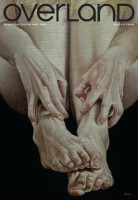Jacinda Woodhead (editor), Overland 218 (Autumn 2015)
The editor has gone, long live the editor. With this edition of Overland, Jacinda Woodhead, who has been deputy editor for a while, takes over the main job. Most of the old editorial and design staff remain, and there has been no radical transformation.
For example, like the previous edition, this one includes the results of two writing prizes. These are the Nakata Brophy Short Fiction and Poetry Prize for Young Indigenous Writers, and the Judith Wright Poetry Prize:
- The judges praise the winner of the former, Backa Bourke by Marika Duczynski, for its ‘energetic prose that knows when to withdraw’. What looks like a rough and ready outback yarn about floods and death and young men on motorbikes takes a surprising turn right at the end, in prose so withdrawn that the surprise hangs on a single word. To be parochial for a moment, I was chuffed to see that the writer, in this overwhelmingly Melburnian journal, lives in Sydney.
- Peter Minter’s judge’s report on the Judith Wright Prize pays elegant tribute to Judith Wright herself in reflecting on form in poetry as ‘a moral or ethical problem, a political gesture’. Interestingly enough, the first prize winner, Hyper-reactive by Melody Paloma, has a similar linguistic vigour to ‘Backa Bourke’.
This issue is also like its predecessors in including writing about writing (including an essay on literary envy/jealousy that takes its title from the Clive James poem that begins, ‘The book of my enemy has been remaindered / And I am pleased’), and an interesting mix of short stories, this time two realist pieces and two that nudge into the surreal.
The issue differs, perhaps accidentally, in having an identified theme. Jacinda Woodhead’s editorial says it ‘gives voice to women’s unfiltered experiences of this world, and other subjects on which there’s been far too much silence’. To mix metaphors, it delivers that voice in spades, though it by no means a predominantly female voice.
Alison Croggon’s column begins ‘The first time I was raped,’ builds to a passionate cry that her children ‘have to live in this world where, all the time, men hurt women, dismiss women, marginalise women, silence women, kill women’, and ends with a quietly lethal account of a ‘pleasant and intelligent man’ communicating by his manner that a protest at women being ignored was ‘a footling political point about feminism’. It’s two tough pages and Croggon has an equally fine piece online about the writing of it.
Hackers, Gamers and Cyborgs by Brendan Keogh discusses the phenomenon of Gamergate, in which a number of woman video game developers have been attacked vehemently. I’ve been aware of Gamergate as one of those online places where outrage and reciprocal vilification flourishes. This essay instructively situates it in ‘the broader patriarchal structures in which video game culture emerged’. Even though the word sexism doesn’t appear, it’s reassuring that the concept of patriarchy is still alive and doing good work.
Justin Clemens, who is a poet among other accomplishments, writes about the US Senate Select Committee on Intelligence’s report into the CIA’s detention and interrogation program. The essay, Torturing folk, explores the implications for civil society of the current practice of and debate about torture. Paradoxically, he argues that even to debate the appropriateness of torture is in effect to close down freedom of speech.
Russell Marks puts his head above the parapet in More than taboo, arguing the case against demonising paedophiles. Specifically, government funding has been channelled primarily into identifying and punishing offenders; funding has been withdrawn from programs that provide support to survivors, including programs such as SafeCare in Perth and Cedar Cottage in New South Wales that also offered treatment to offenders, with demonstrated success in preventing recurrence.
There’s more: Fiona Wright on grieving communally on facebook; Stephen Wright on different children; Michael Bogle on The Atomic Age, an exhibition about nuclear weapons shown in Brisbane, Melbourne and Sydney in 1947 and 1948 (which sent me back to Robin Gerster’s wider-ranging ‘Exile on Uranium Street: The Australian Nuclear Blues’, in Southerly No 1 2104).
Overland is clearly still in good hands.


